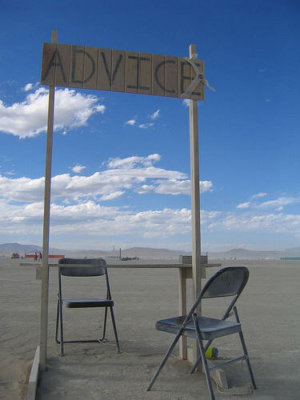Giving Advice- Why it Could Be Ruining Your Relationships

By: DncnH
by Andrea M. Darcy
We are a “how to” society these days, bombarded with do-it-yourself videos and TV shows, self-help books, and advice columns.
The knock-on effect is that many of us freely dish out unasked for advice without even realising that we are doing so – or what negative affects this might be creating.
5 ways giving advice damages relationships
Here are five reasons why unasked for advice can be the worst thing when it comes to relationships.
1. Advice is actually a form of judgement over support.
You might think you are being helpful by offering unsolicited advice, but giving your opinion freely actually says to another, ‘I don’t think you are smart enough to find your own answers.’
2. Giving advice stops others from learning and growing.
Giving advice is a hidden way of making assumptions about another person. You are assuming that they don’t have the personal resources to find answers within themselves. This stops the other person from taking the time to look within and listen to themselves, or even find their own resources at all. Which they do have – we all do.
You are also stopping any kind of creative brainstorming that might lead to you actually learning a thing or too yourself.
3. The advice that might seem right to you is often wrong for another.

By: Laughlin Elkind
Advice assumes that your perspective is the right one and the way you see things will work perfectly for others. But you have had a unique set of experiences that might be very different than the other person’s.
So while it might seem perfectly logic to you that your friend quit her job because her boss has been rude, you might have had a successful life that means you navigate conflict easily. Your friend, on the other hand, might need the opportunity to stay put and break a longstanding pattern of not communicating her needs and boundaries in the workplace.
4. Advice closes instead of opens communication.
It might feel that offering your unsolicited opinion will open the door for creative, mind-expanding discussion on how your ideas can improve the life of the other person. But you’ll find more often than not the conversation ends or the other person changes the topic because they feel judged and feel defensive.
5. Advice is often selfish and pushes people away.
The truth is that we rarely give advice out of a desire to help others. If we truly wanted to do that, we’d instead develop good listening skills.
The real reason most of us give advice is that we want to feel better about ourselves. We want to feel wise, useful, powerful, or like our own experiences have had a purpose.
Or, worse, we are using ‘giving advice’ to hurt the other person or passive aggressively express our anger. “You know, if I was you, I’d buy a small calendar just for putting everyone’s birthdays in, but then again I’m not the type to go and forget birthdays of those I apparently love”.
The result of all your great unsolicited advice is….?
So in summary, even if you think you give great advice (which can be helpful if it’s asked for!) is that if it’s unasked for, it instead might have the effect of:
- pushing people away
- stopping people from trusting you
- diminishing others self-esteem
- stopping others from making good decisions
- leaving others seeing you as arrogant
- leaving you feeling lonely.
What should I do instead of giving advice?
So what is better than advice? Try the below.
Listen properly. Only focus on what the other person is saying, without an agenda or need to bring your own experiences to the conversation.

By: Nishanth Jois
Ask good questions. Be wary of ‘why’ questions, which cause someone to look backwards, get lost in self-reflection, and perhaps feel judged. For example, ‘why did you take a job you don’t like’ feels critical and would cause someone to anxiously examine their past. Try ‘what’ or ‘how’ instead – ‘what does your ideal job look like, and how can you find such elements already in the job you have?’ encourages the other to look forward and see things positively.
Offer unconditional positive regard. This is a psychological term that refers to the notion of creating a space of acceptance and non-judgement for another whether or not we agree with their choices or actions. The great thing about unconditional positive regard is that it recognises the other person has their own set of resources, even if you can’t quite see them.
Learn to empathise instead of sympathise. A lot of unsolicited advice is often sympathy in disguise. and sympathy is thinly disguised pity – “I feel sorry for you because you are in a difficult place beneath where I myself am”. Empathy, means you merely try to understand the others viewpoint and struggles without any inner comparison. [For more on this, read our article on empathy vs sympathy.]
Give your ideas in an open-ended way and only when they are asked for. Advice does have its time and place, and that is always when it is asked for. If someone does ask you for your opinion, however, try to couch it in the language of openness. Don’t ever imply one answer is right to the inclusion of all other options, make it clear what you suggest is only your viewpoint, and ask them what they think of your opinion. You might end up receiving some useful feedback in return.
Can you think of another result of giving advice that is not so desirable? Or have a story about giving advice you’d like to share? Do so below.
 Andrea M. Darcy is a health writer and a mentor who loves writing about relationships. Find her @am_darcy
Andrea M. Darcy is a health writer and a mentor who loves writing about relationships. Find her @am_darcy





I absolutely love this article 🙂 I want to send it to a friend who is always giving advice, but I can’t because that would be giving advice. #Catch22
Ha ha. Yes, hard call!
I feel people give advice because they need that advice themselves. I had someone I was dating tell me how I should have handled a woman flirting with me. She told me I shouldn’t have waited until the end of the conversation until I said I was attached. I told her I didn’t know she was flirting until the last couple questions. But at least I said I was taken.
Fast forward 5-6 months and some guy flirted with her. She not once told him she was attached. When I asked her why she told me she just wanted to leave the store. She also said there are so many different ways to handle that situation. I was upset of course because I at least acknowledged her yet she didn’t acknowledge me. After all her “advice” she tells me well I forgot that conversation we had months ago. I was like really?! We didn’t have a conversation before I got flirted with yet I still mentioned you. She just blew it off.
Hi Jason so here’s the thing. We don’t think this has anything to do with advice giving. We think it has to do with a relationship with communication issues and with two people who have relating issues and are lashing out at each other. The energy of your comment is anger. You are holding on to something from half a year ago, this happens in relationships where there is poor communication and ongoing war. So the other confusing thing is, you say “I was dating”, past tense. so is this all a past relationship and over and done with but you are still furious and playing over this scenario again and again in your head? If so, then this is likely related to way bigger issues, we’d bet money related to childhood, like being shamed in childhood, never listened to in childhood, etcetera. And yes, we’d advise therapy. Not just as we are a therapy company, but because why live with this level of anger and unhappiness when therapy helps you find other ways to live? When we have these kinds of unresolved issues we end up always attracting fiery, difficult relationships, and never being happy. We think you deserve more than that, to learn how to be yourself and get into a relationship that feels safe and secure. Best, HT.
I get a gold star for being someone who gives unsolicited advice. Now I realize why friendships have ended. Self awareness can be a great step but Now I feel the need to apologize to friends I was once very close to. Not to try to restart but own my actions. We live in same area and passes cross a lot. Should I and what could I say?
I would just forget it. there are many reasons relationships end besides thinking that ir was because you gave unsolicited advice. some people are stubborn. losers , arrogant and you dont need them in your life .
i recently had a situation with a friendship of 49 years . she moved to the mainland from puerto rico and for one whole year even though I acknowledged her with a welcome gift decided not to contact me. thinking that perhaos she or her hisband had diedi called her a month ago. well at age 82 and 85 husband they decided to purchase a home. after selling the one of mnay years in puerto rico . we all know and she does know that a house will mean repairs etc but see she knew I and others would l have suggested that she may had been bests renting a nice place. well let it be. she will find on her won how difficult is to find peoplee that want to fix things. today I am completing some minor projects in my house that have taken 6 bloody months of estimates, workers running late or not showing up . two already late this morning
. by age 82 if i am still alive I will sell God willing n and move to a nice apt and follow my own unsolicited advice (LOL) make new friends ( advice) and try not give advice as they dont want it, Period,
This text should be written more carefully. You can not talk about this topic as a general rule. Parents that even have a regular good relationship with his sons, often gives unsolicited advice. Is how parents perform today and since humans form social cels as families. Is the wisdom and or experience transmission to the new generation to preserve life and culture. You made a terrible mistake with this text.